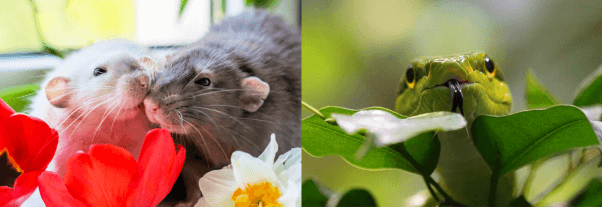Urge Dictionaries to Ban Derogatory, Speciesist Definitions of Animals or Label Them as Such
Many popular dictionaries—including Merriam-Webster, the Collins English Dictionary, the Oxford English Dictionary, Dictionary.com, and WordReference.com—include speciesist slurs in their definitions of “dog,” “pig,” “rat,” and “snake,” and they need to remove them or label them as such. Definitions like these fuel speciesism—a belief that humans are superior to all other animals.
Most people who share their lives with dogs know how smart, loving, and loyal they are. Similarly, pigs are also playful, friendly, sensitive, and intelligent. Much like people, pigs enjoy listening to music, playing with soccer balls, getting massages, and even playing video games!

If rats went to school, they would be straight-A students. They excel at learning and have excellent memories, never forgetting how to navigate a route once they learn it. They are highly social animals who become attached to each other, love their families, and easily bond with their human guardians—returning as much affection as is given to them. As for snakes, they are actually shy and secretive, and contrary to most people’s perceptions, they’re not aggressive or territorial. Fun fact: They are basically solar-powered! They rely on external sources (notably, the sun) to give them energy.

All these animals are complex and intelligent. Calling a human another type of animal should be a compliment, not a slur.
Speak up for animals! Ask dictionaries to label their harmful animal-based slurs as speciesist or remove them from the definitions altogether.
1. Tweet at @MerriamWebster, and comment on its Instagram account. Tell the editors that a dog is not “a worthless or contemptible person,” a pig is not “a dirty, gluttonous, or repulsive person,” a rat is not “a contemptible person,” and a snake is not “a worthless or treacherous fellow”:
2. Post a photo of your dog, rat, snake, or pig on Instagram with a sentence telling these dictionary editors why they should ban derogatory, speciesist definitions of animals or label them as such.
Please feel free to use our sample text, but remember that using your own words is always more effective. Be sure to tag @MerriamWebster, @Dictionarycom, and @Collins_Dictionary_Official in your post!
Sample text:
Dictionaries like @MerriamWebster, @Dictionarycom, and @Collins_Dictionary_Official should ban derogatory, speciesist definitions of [insert animal here] or label them such because [insert animal here]—just like [insert companion animal’s name here]—are sweet, intelligent individuals and they shouldn’t be used as insults.
3. Contact Merriam-Webster and WordReference.com online. Urge the editors to remove hurtful, speciesist definitions of animals like dogs, pigs, rats, and snakes or label them as such:
4. Comment on the Oxford English Dictionary’s Twitter account, @OED. Urge it to remove all definitions of animals that include harmful, inaccurate slurs meant to insult humans or to label them as speciesist:
5. E-mail Merriam-Webster’s podcast, Word Matters, at [email protected] to suggest that its hosts talk about speciesism and speciesist language on the show.
Please feel free to use our sample letter, but remember that using your own words is always more effective.

